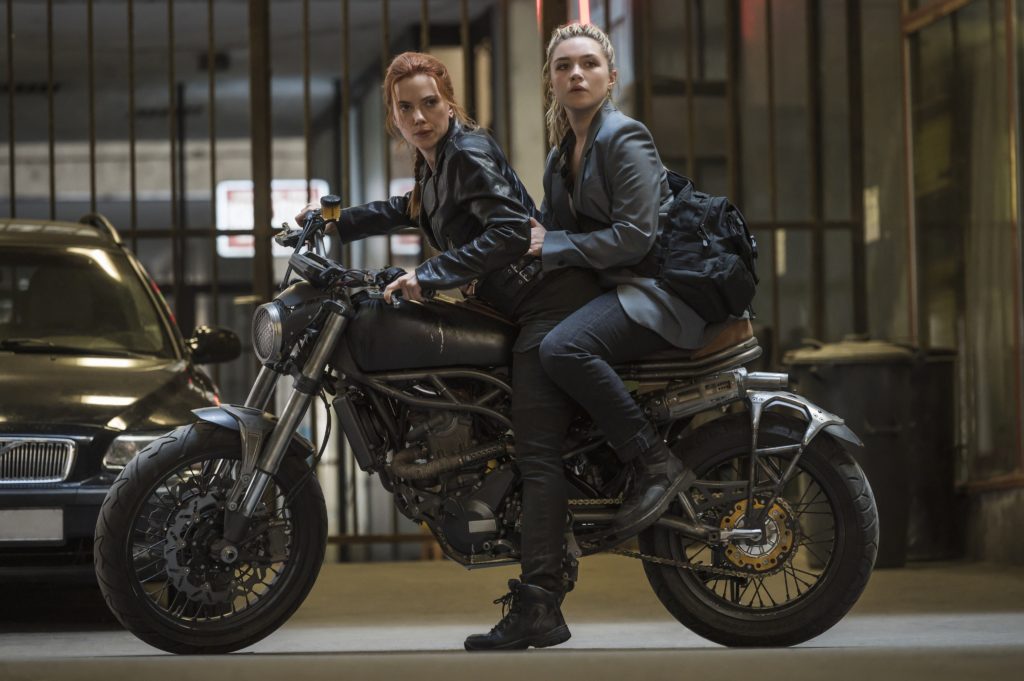Black Widow

Scarlett Johansson and Florence Pugh in Marvel Studios' BLACK WIDOW. Photo: Jay Maidment. ©2020, Marvel Studios.
There’s a moment in BLACK WIDOW where a character takes off a mask, revealing themselves to be another person, then takes off a second mask, revealing themselves to be the first person all along. That’s a perfect metaphor for a movie that struggles toward something it isn’t.
The story opens on idyllic origins disturbed by a dark secret.
“You remember when I told you that one day we would have that big adventure? Today’s the day,” says dad, Alexei Shostakov (David Harbour).
Melina (Rachel Weisz), young Natasha (Ever Anderson), and Yelena (Violet McGraw, later played by Florence Pugh), pile into the family truck and head to a private airstrip to flee to Cuba. They’re singing a familiar Don McLean song along the way, punctuated by the backdrop of a large flag and a football field. You know, in case you didn’t see the opening insert in giant letters that said, “OHIO.”
The idea, if not the film’s hackneyed plot of stealing a slightly more effective method of mind control than the one they already have, borrows from the acclaimed television series, The Americans. It certainly doesn’t borrow from the comics in which Natasha married to Alexei, a.k.a. Red Guardian.
Followings a title sequence that appears ripped straight out of a 90’s serial killer movie, the plot fast-forwards to the aftermath of the Sokovia incident—collateral damage inflicted in AVENGERS: AGE OF ULTRON. Thaddeus Ross (William Hurt as a literal mustachioed villain) tries to hunt down the disbanded superheroes just two steps ahead of him.
Natasha (Scarlett Johansson) reunites with Yelena, having defected from the Black Widow program, in Budapest to find the Red Room and the Black Widow Ops architect Dreykov (Ray Winstone effecting the worst Russian accent I’ve ever heard, and I’ve seen JOHN WICK). She wants to make amends for the “red in her ledger”—a phrase we must have heard her say more than a dozen times in the Marvel Cinematic Universe. And that, too, is emblematic of what’s wrong with this movie.
Instead of fleshing out a detailed story of intrigue and betrayal, the writers dress up the sole objective of finding and killing Dreykov with not-so-Easter Eggs—where’d that green vest come from—and banal jokes that won’t die. Admittedly, Pugh turns one of gags into comedy gold when, in her relentless mocking of Natasha’s ridiculously non-functional acrobatics, she feels disgusted. And so do we.
The comedy is filler meant to distract us from the circuitous plot that starts with stealing secrets from The North Institute (rewritten as a SHIELD/HYDRA project instead of Gynacon, as in the comics) that Arnim Zola should’ve already shared. Even if he hadn’t, why send Red Guardian to do a job when SHIELD was indistinguishable from HYDRA since the organization’s inception? What was Mitchell Carson doing as a double agent?
But it gets worse. The screenplay, written by Eric Pearson (THOR: RAGNAROK), paints itself into dead ends, painted out by comic flashbacks that belong in a Bill and Ted movie. At least when Bill and Ted make comic quips or break the fourth wall, the viewer doesn’t suffer from tonal whiplash.
The movie’s final, and most egregious error, isn’t in making lauded actors like Pugh suffer through poorly written, expository dialogue, or badly timed comedic jabs, but in weaponizing trauma. Movies have a history of portraying women either as succumbing to hysteria or stoically concealing their pain under a tight top and ponytail.
The film fails to expand upon the cold war context and draw further parallels between the Russian and American empires’ conditioning and desensitizing soldiers to violence to further the state’s agenda. Think about the atrocities committed by the CIA and Special Forces during the Vietnam War; as enemies go, HYDRA and Russians seem rather superfluous. But Marvel will never call out America’s complicity; instead of taking a political stance, the film instead wastes a good chunk of running time explaining where all the bits and bobs of Natasha’s wardrobe came from.
There’s a story concept somewhere in there, by Jac Schaeffer, buried underneath what feels like a pile of studio notes. BLACK WIDOW begins with a premise of personal stakes. This is where CAPTAIN AMERICA: THE WINTER SOLDIER succeeded. But from there the two films diverge. SOLDIER built up a history between its adversaries. WIDOW introduces us to the Taskmaster, but the reveal is both obvious and unimaginative, as the person behind the mask is just as much of a chess piece to the plot as they are to Dreykov. So focused on using disability and trauma as plot devices, the filmmakers never plumb the depths of what it is to lack agency.
A facile metaphor against the times, the modern superhero franchise hides real issues behind a mask, or blonde hair dye and a green vest.